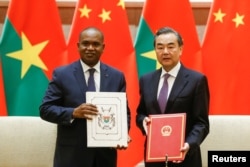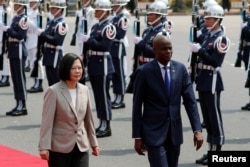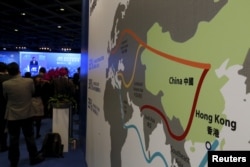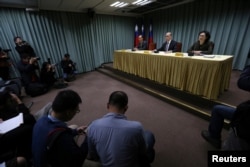Taiwan will struggle to stop a shrinking pool of mostly poor diplomatic allies from shifting allegiance to its rival, China, because it lacks the amounts of money they want, experts and officials in Taipei say.
The number of countries that recognize Taiwan diplomatically fell to 18 last week after Burkina Faso severed 24 years of relations.
The West African country, one of the world’s poorest, established formal relations with China days later and became the fourth country to make the change since 2016.
Taiwan had extended medical and farming support to Burkina Faso, but Taiwanese media said China had offered $50 billion last year. China often sends investors to Africa to tap natural resources and build infrastructure.
Failure to match Chinese money could shift more allies from Taipei to Beijing, experts believe, minimizing Taiwan’s voice in the United Nations and hurting its struggle to be seen internationally as separate from China.
“Quantitatively, China can undoubtedly offer much more than Taiwan and can offer that over a spectrum that is much wider than the Taiwan side’s spectrum,” said Fabrizio Bozzato, a Taiwan Strategy Research Association fellow.
China sees Taiwan as part of its territory rather than a state entitled to diplomacy. Each side has ruled itself since the Chinese civil war of the 1940s.
Backed by more than 170 countries including the world’s most powerful, China insists the two sides eventually unify despite polls showing Taiwanese prefer autonomy.
Taiwan's government says China pays Taiwanese allies to switch allegiance as a way to put pressure on President Tsai Ing-wen. Tsai took office in Taiwan two years ago and rejects Beijing's idea that the two sides belong to a single China.
Funding limitations in Taiwan
Taiwan gives aid to its allies based on evaluations of what each one needs to develop socially or economically, foreign ministry spokesman Andrew Lee said. It may set a timeline of two to three years, Lee said. Common types of aid are scholarships, farming technology and medial programs.
Taiwan has a limited budget, Lee told a news conference Tuesday.
“Our government maintains a steady stance, and the most important thing now is what the president has indicated and foreign minister has emphasized, which is no diplomatic acts that are related to so-called money diplomacy,” he said.
“Presently, with our government financial problems and our foreign affairs budget being only so much, we must use the smallest budget to do the biggest deployment, so in this aspect we must positively use our creativity.”
On Tuesday Taiwan agreed to expand economic and infrastructure aid to Haiti with an eye toward luring more Taiwanese investors to the impoverished Caribbean country. They reached that deal as Haitian President Jovenel Moise visited Taipei.
Taiwan seldom specifies amounts of aid to particular countries, which are mostly in the Caribbean, Central America and the South Pacific.
More money, faster, from China
China as a Communist country need not vet aid money through parliament or test the opinion of citizens who may prefer the aid money be kept at home, analysts say. It has more money as well as farther-reaching programs to distribute it, they add.
One channel is the $1 trillion Belt-and-Road Initiative for building new infrastructure around Eurasia.
China also can encourage its tourists to visit impoverished countries as a source of hospitality income, Bozzato said. Chinese took 130.5 million trips overseas last year, more than in 2016.
Some money from China reaches its allies “under the table,” he said. China is “richer” than Taiwan and is seen as a “great power that keeps on rising,” he said.
South Pacific nations allied with the United States, he said, “can extract resources both from the traditional Western partners and the new Chinese partner.”
Exporters from nations allied with Beijing have access to the world’s biggest consumer market, as well.
When the Dominican Republic cut ties with Taiwan May 1, its presidential office website said domestic industries had “requested greater diplomatic, commercial and economic growth with the People’s Republic of China.”
Since the African nation of Sao Tome and Principe left Taiwan for China in 2016, Beijing has pledged $146 million for the modernization of its international airport and construction of a deep-sea container port to facilitate Chinese trade in Africa.
Taiwanese aid had focused on farming, energy and public health.
Countries that need peacekeeping can look to China for help because it’s a United Nations Security Council member, as well, said Huang Kwei-bo, international affairs college vice dean at National Chengchi University in Taipei. Taiwan has no U.N. seat.
“You could threaten Taiwan a bit and it would give you more money, but that’s still not as much as Beijing can offer,” Huang said.








